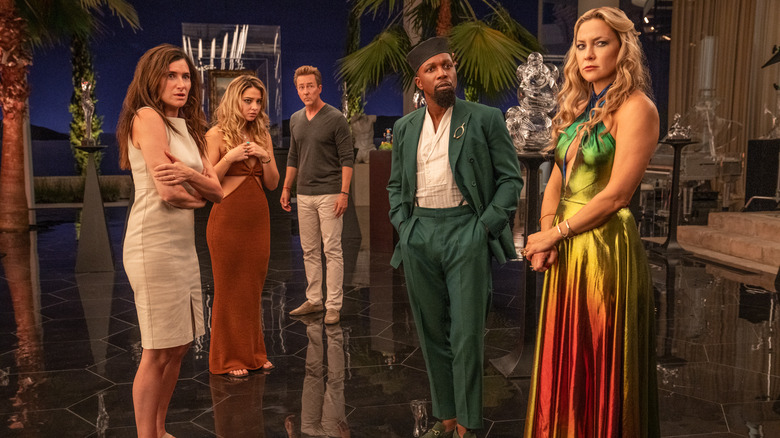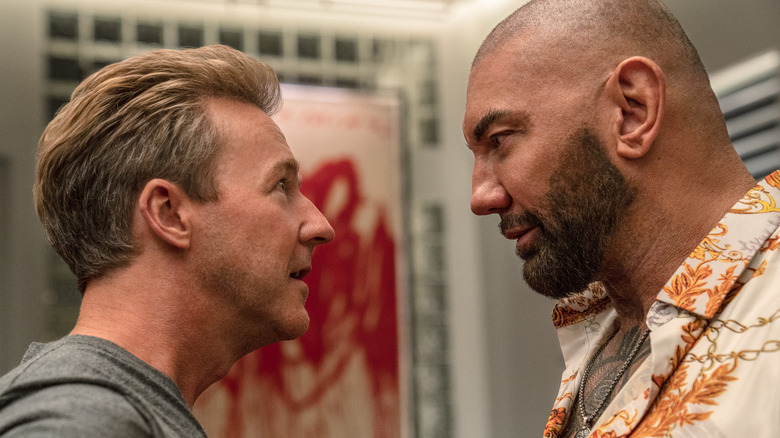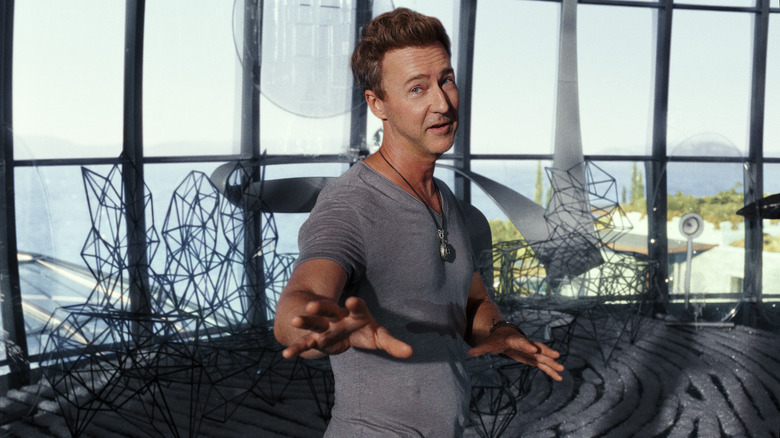Glass Onion Ending Explained: The Perfect Mystery
This post contains spoilers for "Glass Onion: A Knives Out Mystery."
Creating the perfect conclusion to a murder mystery couldn't be a more complicated endeavor. You need to come up with an ending that the audience is simultaneously surprised by but could actually have been figured out by any of them at any point during the movie. The perpetrator can't be someone too obvious, and if they are, you have to play with the conventions of the genre in a way to make people believe that their first instinct couldn't be correct because the form dictates that there must be something else going on. It's rather astonishing that some writers have the ability to thread this needle time and time again, and though it is still early in Rian Johnson's tenure as the modern murder mystery man, he has threaded it once again.
"Glass Onion: A Knives Out Mystery" opted to try out the pathway of the murderer being the most obvious candidate, Edward Norton's billionaire Miles Bron. In a film all about toxicity or the one percent, you might think having the eccentric billionaire be the murderer would be putting a hat on a hat, driving the message of the movie down your throat. Surely, Johnson has something up his sleeve to reveal, right? Just as Daniel Craig's Benoit Blanc does, we come to realize that it really is all that simple and "dumb." We're made to be fools that the solution to this case could have been anything other than a powerful and wealthy man silencing anyone or anything that gets in the way of increasing his profit and status. He believes what he does makes him appear clever and savvy, but in reality, he isn't nearly as clever or savvy as he thinks he is.
How the rich fool you
Miles Bron isn't explicitly based on a single billionaire, but the people within the class that includes the likes of Elon Musk, Mark Zuckerberg, and Jeff Bezos all share this unquenchable desire to prove their superiority, believing the money and power they've accumulated over their lives was right and just. Of course, their superiority is a myth, but so many people buy into it. People flock to what they believe to be the great innovators of the world with the hope that they, too, will be able to hobnob among the elite one day. Capitalism warps people to believe that someone's personal wealth determines the worth of a human, and if these folks are the wealthiest in the world, that must mean they have earned it.
Before the start of the picture, Norton's Miles Bron has completely cut out his business partner — who also had the idea for the company in the first place — Andi Brand (Janelle Monáe) from the company, and everyone in her life who she thought to be a friend turns on her because they have become sycophants for Miles, not wanting to jeopardize their ability to climb the ladder. When Andi rediscovers the proof that will prove she founded the company, he kills her. He thinks he has figured out a way to eliminate who gets in his way that even the great Benoit Blanc can't figure it out, but he accrued his wealth through manipulation and riding coattails. The folly of Miles Bron is as plain as day, but part of us doesn't want to believe it. You can always count on a billionaire to disappoint.
When humanity is a radical notion
Of course, the other major twist of "Glass Onion" is that the film doesn't become a murder mystery. It has been one since the opening frame, and the person we believe to be Miles Bron's ex-partner Andi is actually her twin sister Helen, both exquisitely played by Janelle Monáe, investigating her sister's murder with the help of Benoit Blanc. In their investigation, Helen finds the original napkin that her sister conceived their tech company, which Miles very dumbly kept as a token of his own ego and dominance. When this irrefutable proof is brought to the light, her former friends start thinking that it might be a good idea to distance themselves from Miles. That is until Miles sets the napkin aflame, and they all retreat cowardly back under his wing. It takes Helen using the hydrogen-based energy source the company has been developing against them to completely destroy Miles' island that they all finally turn away from the billionaire.
If the systems of the world were just, it shouldn't take this explosive act (that includes the destruction of the Mona Lisa) to make people see the light. But it does. People are perfectly willing to sacrifice their own empathy and humanity for the sake of another dollar. They know that for them to rise someone must fall, and they won't do anything about it until it literally blows up in their own face. While the group of old friends deciding to back Helen at the end is the right thing to do, it's incredibly damning that it takes that long to be on the right side of history. In reality, they're more concerned about appearing on it rather than actually being on it. Doing what's right shouldn't be this hard.
It's fun to watch a billionaire lose everything
What makes both "Knives Out" and "Glass Onion" so wonderful is that even though all of these political themes are on the surface for all to see and think about when you leave the theater, their ultimate goal is to be a good time. For me, few things are more entertaining than a billionaire rightfully becoming a laughing stock and getting their s*** absolutely wrecked. It's the ultimate power fantasy for all of us normies to take these megalomaniacal, egotistical pricks down several pegs. Watching Helen break every valuable thing in sight, setting stuff on fire, and eventually making the whole island go ka-boom is more exciting to me then any superhero battle you could put in front of my eyes.
"Glass Onion" is three things: a commentary on class, a murder mystery, and, arguably most importantly, a comedy. Rian Johnson wants to delight and make you laugh, and this overblown, spectacle-driven finale does just that. The audience I saw it with was hooting and — if you would believe it — hollering as well. We loved that this douchenozzle was revealed to be exactly who we thought he was and properly got what was coming to him. Then you go from this explosive sequence to those punchy opening chords of the titular song by The Beatles over the credits. "Glass Onion" leaves you on the perfect high.



